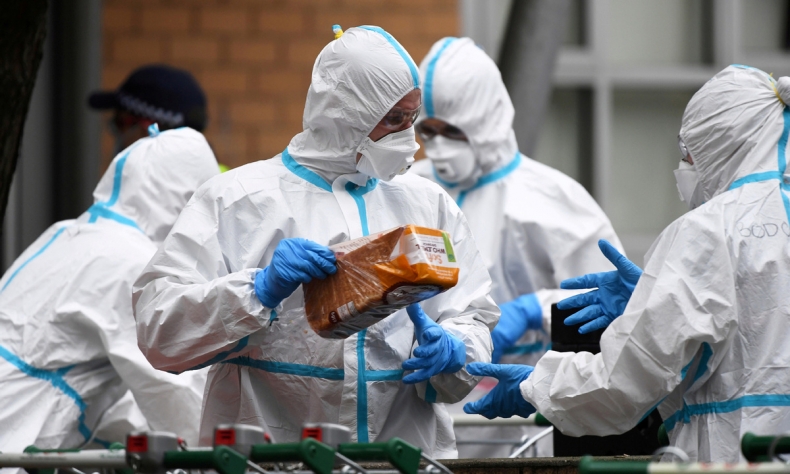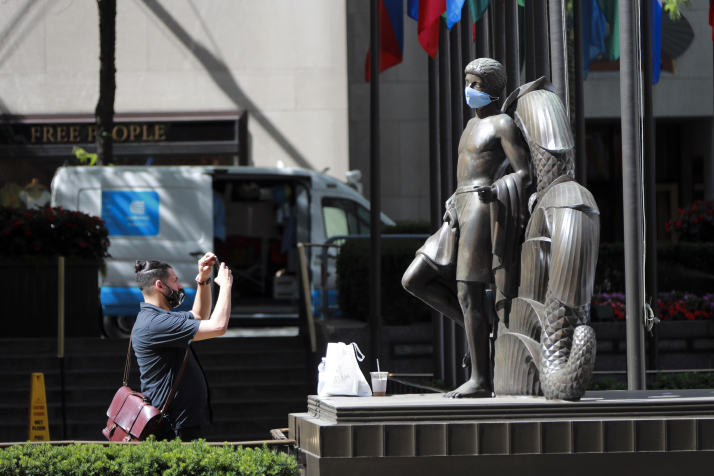US Suits Against China Over COVID-19 Flout Both Int’l and American Laws

Now, in order to avoid losing his reelection bid, blaming China has somehow become President Donald Trump and his administration’s preferred strategy. This greatly undermines the U.S. image and its international standing.
As of now, the U.S., unfortunately, is leading the world in novel coronavirus disease (COVID-19) infections and fatalities, with its political, economic and social order having taken a hit. At the same time, some officials, groups and individuals in the country have filed lawsuits in domestic courts, demanding that China be held liable for the damage caused to the U.S. by COVID-19 and asking for huge compensations.
On April 21, Missouri became the first U.S. state to sue the Chinese Government over its handling of the coronavirus situation, alleging China’s response led to its devastating economic losses. The lawsuit was filed in the U.S. District Court for the Eastern District of Missouri by Missouri Attorney General Eric Schmitt. Then on May 12, the State of Mississippi filed a similar lawsuit.
The U.S. Government has expressed support for these lawsuits. Some Congress members have also said that China must pay for the coronavirus and the U.S. should start writing off part of its debt to China.
At a critical moment when the pandemic is raging and people’s lives are threatened, it is irrational that some U.S. politicians, instead of fighting the virus, are focusing on scapegoating and stigmatizing China to conceal their own failures.
State immunity
Such lawsuits are routinely deemed frivolous as they distort facts and ignore not only international law, but also American law.
The doctrine of state immunity is derived from the Latin maxim par in parem non habet imperium, meaning an equal has no authority over an equal, and is widely recognized as a principle of international law. China, as a sovereign country, enjoys immunity before U.S. domestic courts, which is its legitimate privilege. Therefore, suing China in a U.S. court challenges the accepted principle of state immunity and disturbs the international order.
Even under U.S. law, its courts have no jurisdiction over such proceedings. Under the Foreign Sovereign Immunities Act (FSIA), China or the Chinese Government is a subject of immunity. Missouri, by naming the Communist Party of China (CPC) as the defendant, has tried to circumvent this legal obstacle and suggest that foreign political parties are not subject to immunity.
However, this proposition is not in line with the legal principle and is a paradox. The Chinese Constitution states that the People’s Republic of China is a socialist state under the people’s democratic dictatorship led by the working class and based on an alliance of workers and peasants. The CPC leadership is the defining feature of socialism with Chinese characteristics. So the CPC is, of course, a subject of immunity in the context of the FSIA.
The attempt to distinguish the CPC from China or the Chinese Government is clearly a deliberate distortion of the Chinese political system. More importantly, Missouri’s complaint, while deliberately distinguishing the CPC from China, insists that the so-called responsibility should be borne by the CPC.
This is self-contradictory because under the FSIA, a foreign state as well as its agency or instrumentality, in principle, cannot be sued in a U.S. court. Although the FSIA does provide a few exceptions to the immunities, the lawsuits against China over COVID-19 fail to fall in the category of these exceptions for tortious, or commercial, or alleged terrorist acts.
As per China’s infectious diseases prevention law, the Chinese Government exercises public authority to tackle the epidemic, which is not tantamount to carrying out any commercial activity. Thus the U.S. law is inapplicable in this case. Besides, under U.S. law, domestic courts can stretch their jurisdiction to such cases only if both the tort and the damage have occurred in the U.S. Since all the endeavors of the Chinese Government cited in Missouri’s lawsuit happened in China, the exception is also inapplicable.
Moreover, the accusation that the novel coronavirus is a China-developed biological weapon, which Missouri’s complaint said could justify the application of terrorism exception, is totally groundless. The science community has not yet traced the origin of the virus. China has taken stringent prevention and control measures, not concealing any facts related to it, and there is no legal causal relationship between China’s epidemic response and the U.S. losses. Therefore, even if the U.S. modifies the FSIA to exempt a foreign state that uses a biological weapon from jurisdictional immunity, it cannot hold China accountable for anything.

No factual or legal basis
Facts show that the efforts of the Chinese Government have effectively contained the spread of the virus. On January 23, Wuhan in Hubei Province, central China, which reported the first COVID-19 cases in the country, was locked down and the most thorough, rigorous and comprehensive possible prevention and control measures were adopted nationwide. UN Secretary General António Guterres described China’s sacrifice in containing the spread of the novel coronavirus as a great contribution to mankind.
Due to the timely and strict measures taken, even in China, except for Wuhan and a few other cities in Hubei, the virus did not spread widely. China also became the first major country to basically control the epidemic. At the same time, its appropriate measures offered reference for neighboring countries such as the Republic of Korea and Viet Nam to contain the pandemic effectively.
In contrast, the U.S., the first country to impose restrictions on travelers from China in January, experienced a sudden outbreak in mid-March. So how can the responsibility be shifted to China except for the U.S. Government’s incompetence and failure to respond to the epidemic and protect people’s lives?
There has never been an international treaty requiring a country to assume liability for the spread of an infectious disease, nor has there ever been a case of seeking or receiving compensation for such a case. Viruses know no border or ethnicity. When a major infectious disease or public health crisis occurs, all humankind suffers.
In the past, several pandemics broke out in the U.S. first and then spread elsewhere, but no country demanded compensation from it. In fact, countries bearing the brunt of pandemics are their biggest victims as well as those doing the most to prevent the spread of the viruses. There has never been a precedent in the international community for “demanding retribution and resorting to accountability,” as this will inevitably incite hatred and create tragedies on a global scale.
Therefore, asking China to bear liability for the spread of COVID-19 goes against both scientific facts and international law.
Some U.S. Congress members, however, have even proposed bills amending the FSIA that would strip China of its immunity from suits in U.S. courts in cases dealing with COVID-19, thus clearing the legal hurdles to trap China.
The separation of powers and checks and balances are the most cherished principles of the American Constitution and its democracy, under which the three branches of government, namely, the executive, legislature and judiciary, are kept separate and can resist blandishments and incursions by the others. The bills to amend legislation to grant jurisdiction to U.S. courts in certain lawsuits deviate from the U.S. constitutional principles and the American legal legacy. It is also an utter violation of international law, which reflects the deep-rooted notion of American exceptionalism.
There is no legal or factual basis for suing China for compensation for COVID-19. It is political blackmail to stigmatize China and play the blame game. When the pandemic erupted, the U.S. Government did not pay enough attention or take timely action at an early stage, causing great damage to its people. Now, in order to avoid losing his reelection bid, blaming China has somehow become President Donald Trump and his administration’s preferred strategy. This greatly undermines the U.S. image and its international standing.
 Facebook
Facebook
 Twitter
Twitter
 Linkedin
Linkedin
 Google +
Google +










